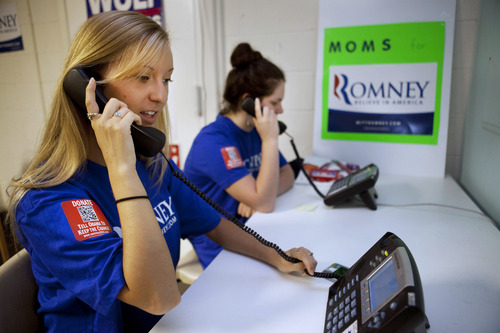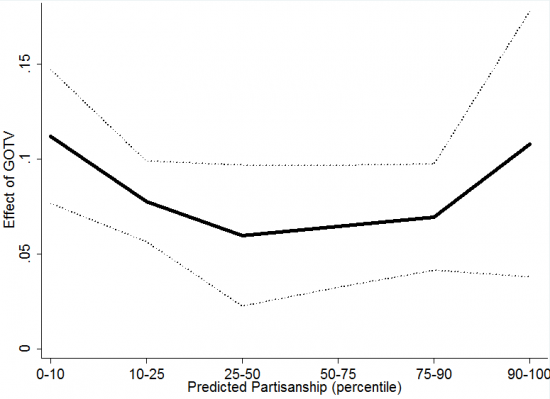
Shannon Westfield, 20, left, and Jane Kernan, 16, make calls for the Romney campaign while wearing quick response code stickers, known as QR codes, in Fairfax, Va., on Tuesday, June 19, 2012. The presidential ground game has gone high tech, marrying old-school organizing work with innovative digital tools. The T-shirts that Romney campaign volunteers wear in Virginia feature a digital code that voters can zap with their smart phones to learn more about the Republican presidential hopeful, which gives Romney field organizers valuable information on how to reach them in the future. (AP Photo/Jacquelyn Martin)
At the Monkey Cage, a couple of Harvard professors report on their new study, which found that Romney’s ground game was apparently as good as Obama’s:
…despite the media accounts of the superiority and sophistication of the Obama campaign, we estimate similar effects for the most Republican and Democratic subsets of individuals, as seen on the left and right sides of the figure, respectively. In other words, both campaigns appear to have been very effective in mobilizing their supporters, and there is no evidence that Obama’s campaign was more effective than Romney’s.
Clearly, these results differ from media accounts which praise the Obama campaign for its technological sophistication. They also differ from a recent post by Aaron Strauss who, using similar data and methods, estimates much smaller effects of GOTV and a notable difference between Obama and Romney. What explains these different results?
I can’t attempt to adjudicate the competing studies here; I just find it interesting that we don’t actually know if Obama’s famously high-tech data game was actually any more effective than Romney’s.
I hope that it’s true that Obama’s tech wizardry – as much fun as it was to read about – didn’t actually give Obama an advantage. Technical wizardly is fundamentally non-partisan; any technical approach gives one side an advantage, the other side will be sure to pick up on eventually. I’d rather believe that Obama’s win was fueled by ideological and demographic advantages, neither of which the GOP can easily copy. But of course, that I’d like something to be true won’t make it true (dammit!).
The Harvard researchers found that both Obama and Romney got about a 7% increase in votes from their GOTV ((Get Out The Vote)) campaigns in heavily contested swing states. Just the possibility that this is true means that neither side will dare invest any less into their GOTV campaigns in the future, even if they know that it won’t lead to anything but parity. And that’s sort of nice: GOTV campaigns are in many ways the Norman Rockwell Idealized Iconic version of politics, in which scores of citizen volunteers walk from door to door, knocking and asking for just a couple of minutes to try and persuade people to vote for their candidate.




...raise taxes on all red states to pay for free healthcare for undocumented immigrants. I don't know, that last one…